Dive into the captivating tale of Jubal, the first musician in the Bible, and his revolutionary contributions to the world of music.
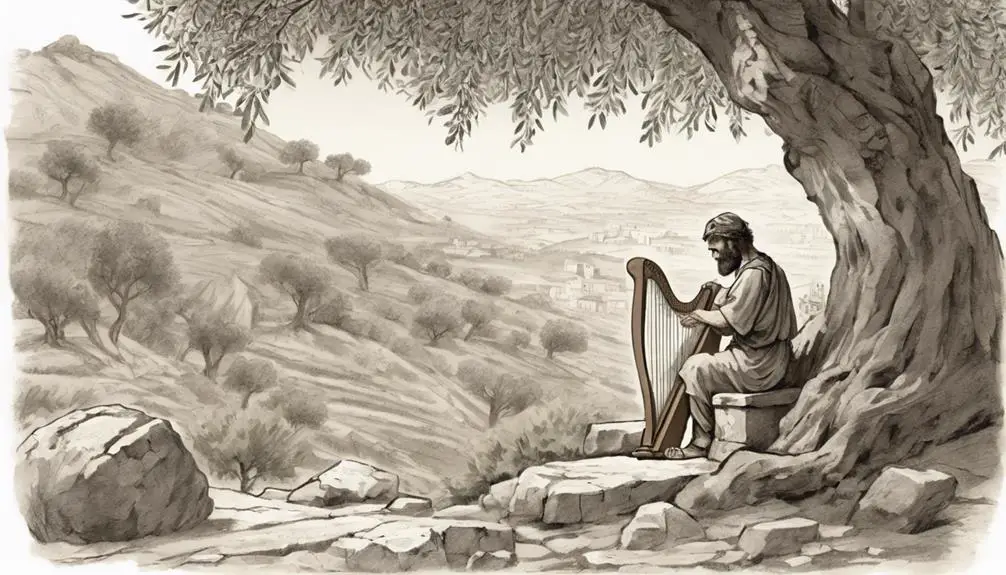
Who Was the First Musician in the Bible
Echoing the aged texts of Genesis, you've likely heard of Adam and Eve, but have you ever pondered about the first musician mentioned in the Bible? His name is Jubal, a character alluded to as 'the father of all those who play the lyre and pipe.'
Imagine living in a world before music was created, and then experiencing the birth of this new form of expression. But how did Jubal ignite this musical revolution? Well, that's a fascinating story you'll want to uncover.
Key Takeaways
- Jubal, mentioned in Genesis 4:21, is recognized as the first musician in the biblical context.
- He significantly contributed to music and culture, possibly innovating the lyre and pipe.
- His role as a musical pioneer has had a lasting influence on the evolution of music.
- Understanding Jubal's story offers insights into music's origins and the significance of ancient instruments.
Unearthing the Biblical Texts
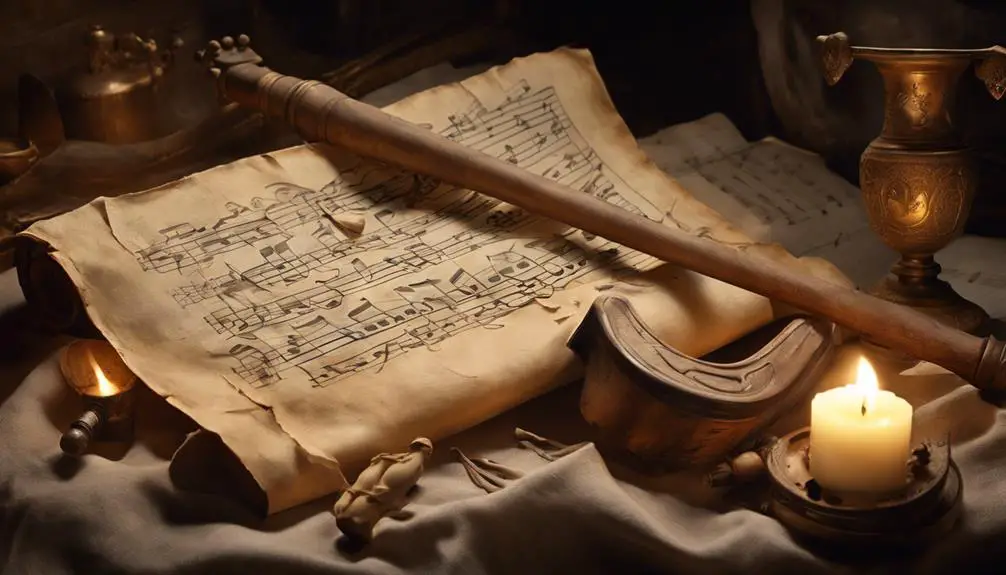
To understand the first musician in the Bible, you'll need to delve into the ancient biblical texts, meticulously examining the original Hebrew and Greek scriptures for references to music and musicians. This isn't a task for the faint-hearted. It requires dedication, patience, and a deep understanding of the languages used in the Bible.
You'll need to rely heavily on biblical translations, which can be a double-edged sword. While they allow us access to these ancient texts, they can also contain errors, omissions, or interpretations that may obscure the original meaning. That's why you'll need to cross-reference multiple translations, ensuring you have the most accurate interpretation possible.
A thorough textual analysis is also crucial. This involves closely studying the original scriptures, looking for any mention of musical instruments, songs, or musicians. You'll need to consider the cultural and historical context, as well as the literal meaning of the words.
Early Music References in Genesis
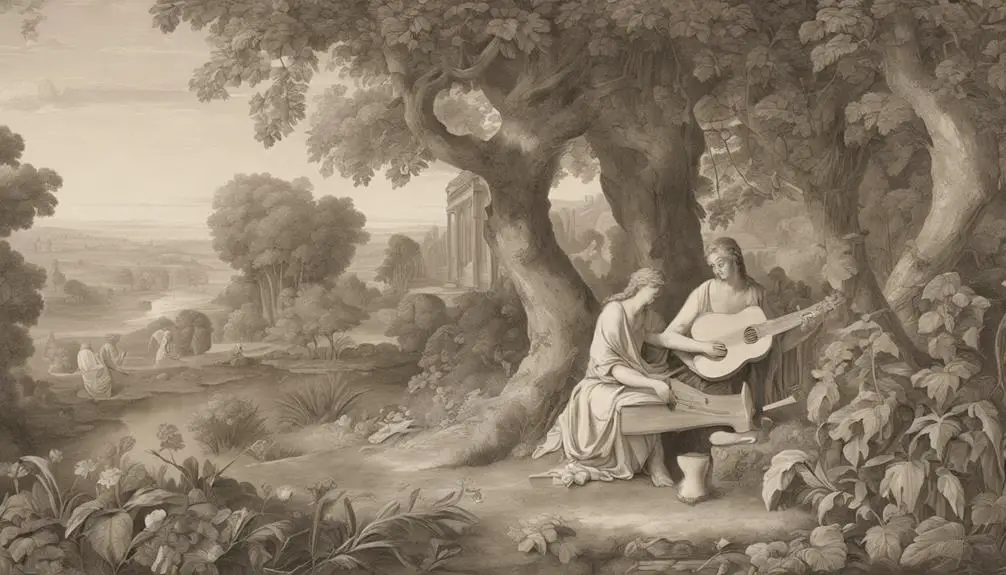
Delving into the book of Genesis, you'll find some of the earliest biblical references to music and musicians. The key to understanding these references lies in the interpretation of the text and the context in which these musical elements appear.
You may consider the 'Genesis Soundtracks' as a metaphorical term. It signifies the rhythmic and harmonic features present in the narrative. You can perceive the symphony of creation in Genesis 1 and 2, resonating with sounds of flowing waters, rustling trees, and the voices of the first humans.
In Genesis 4:21, you encounter Jubal, the father of all who play the lyre and pipe, marking the commencement of musical history according to the Bible. This reference is open to various 'Musical Interpretations'. For some, it signifies the divine origin of music, while others view it as a testament to human innovation and creativity.
Such references, subtle yet profound, reflect the inherent musicality in the fabric of creation. They imply a divine and human connection through music, establishing it as an essential part of our existence. Thus, the book of Genesis presents a symphony of life, weaving music into the very tapestry of creation and human life.
A Closer Look at Jubal's Life
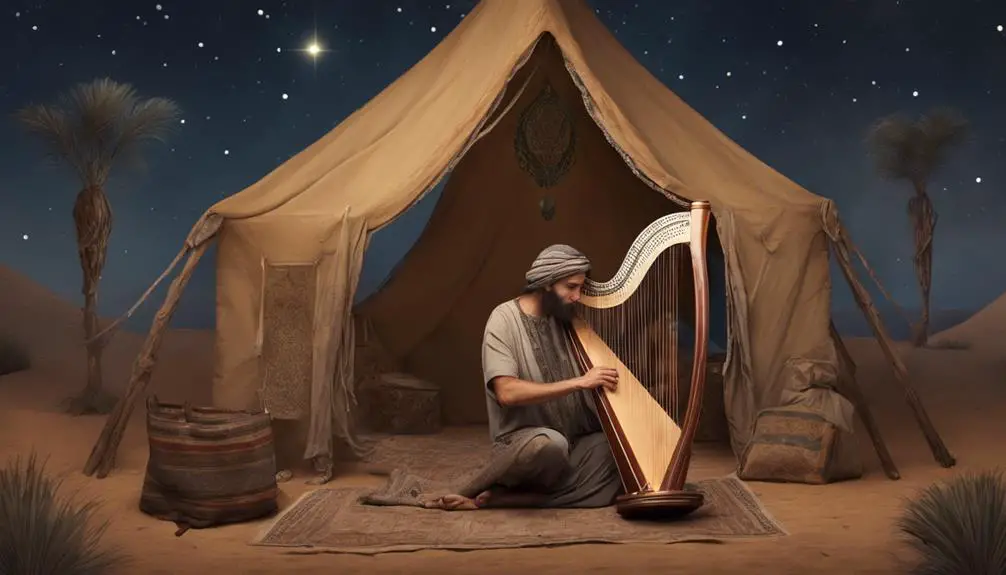
Shifting our focus to Jubal, the first musician mentioned in the Bible, let's explore his life in more detail. Jubal's lineage is significant. As the son of Lamech and grandson of Methuselah, he was part of the seventh generation from Adam through Cain. His name means 'stream' or 'to bring forth', and it's likely that his creativity flowed in much the same way.
Jubal's cultural influence is substantial. He's credited as the 'father of all who play the lyre and pipe', indicating he was a pioneer in the development and popularization of music in his time. His influence didn't stop at the borders of his immediate community; it resonated throughout the ancient world.
His contributions to music and culture were likely many and varied. He might've created new musical techniques, or he could've been the first to use music in religious or social ceremonies. We can't know for sure, but his presence in the Bible signifies the importance of music in early civilizations.
In understanding Jubal's life, we gain insight into the origins of music and its cultural significance, shedding light on its enduring impact throughout history.
Understanding Ancient Musical Instruments
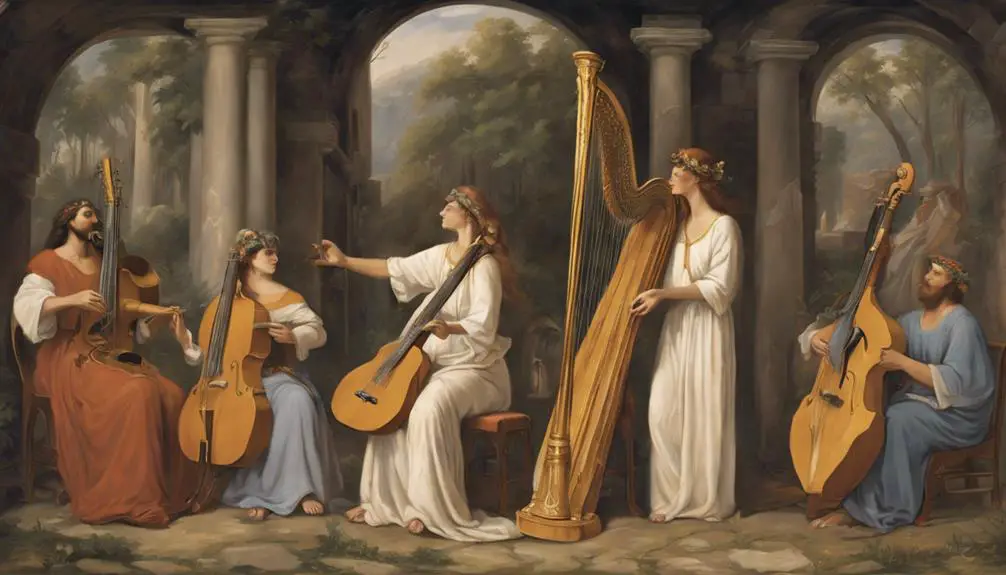
Let's now turn our attention to the ancient musical instruments, understanding their origins, construction, and how they played a pivotal role in shaping music as we know it today. These instruments, often made from bone, stone, and wood, are now known as prehistoric music artifacts. Their creation and use are steeped in the Harmonic Resonance Theory, which proposes that sound vibrations can affect physical objects and, in turn, create harmony.
By examining these instruments, you'll notice that their simplicity belies their significance. They weren't mere entertainment tools – they were fundamental to early rituals, communication, and community-building. Their sounds echoed the rhythms of nature, influencing the development of music theory.
The harmonic resonance of these primitive instruments wasn't just a product of their physical construction. It also included the skill and intuition of the musicians who understood how to maximize the resonant frequencies of the materials. This reflects the Harmonic Resonance Theory, suggesting that these early musicians had a deep understanding of sound and harmony, even without the formal musical education we know today.
From these rudimentary beginnings, music has evolved into a complex art form. Yet, its roots in ancient instruments remind us of its timeless essence and universal appeal.
Impact of Jubal's Musical Legacy
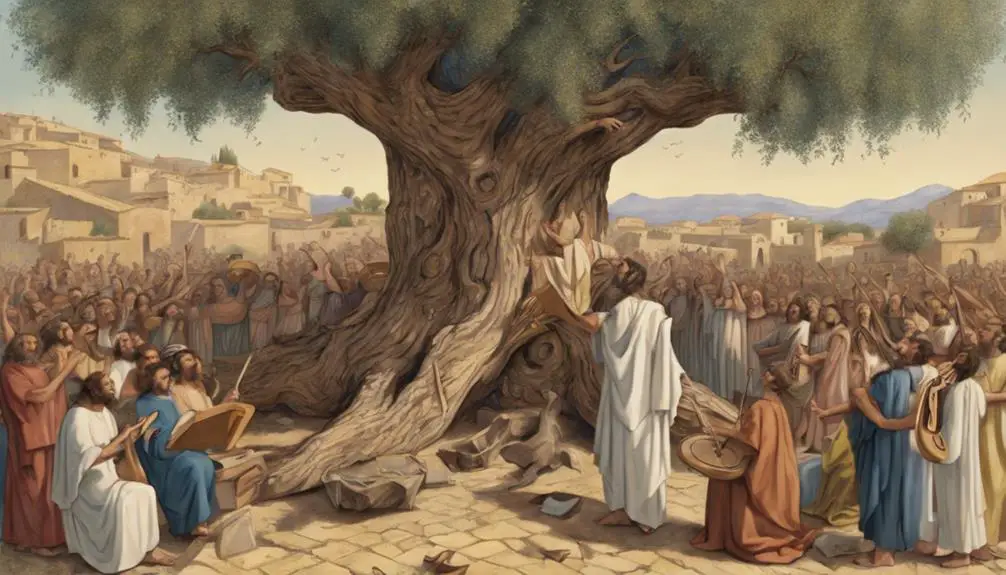
To fully appreciate the depth of our musical heritage, you need to consider the enduring impact of Jubal, the first musician mentioned in the Bible, whose legacy continues to resonate in today's music. Jubal's influence can't be understated. He's credited as the father of all who play the lyre and pipe, instruments that formed the cornerstone of Biblical soundscapes.
Analyzing Jubal's legacy, it's clear his musical innovations laid the groundwork for the rich tapestry of music we've today. His mastery of the lyre and pipe set the stage for the development of string and wind instruments, respectively. These instruments have evolved, yet their basic principles remain, a testament to Jubal's influence.
But Jubal's impact isn't just about instruments. He also influenced the way we perceive and appreciate music. His creative expressions, as seen in the Bible, likely shaped early musical performances, setting a precedence for future generations.
In the world of modern music, traces of Jubal's legacy are still evident. From the rhythm of African drums to the melodies of the classical piano, Jubal's influence reverberates. In essence, every strum, every note, and every beat in today's music can be traced back to the Biblical soundscapes of Jubal.
Frequently Asked Questions
What Role Did Music Play in Early Biblical Ceremonies and Rituals?
Music played a crucial role in early biblical ceremonies and rituals. You'd find biblical instruments used in worship, celebrations, and even warfare. These instruments' usage was wide, creating a spiritual impact that connected people to God.
Music was seen as a divine gift, engaging the emotions and aiding in expressions of faith. So, you can see how music held a sacred place in these early biblical times, influencing spiritual practices profoundly.
How Has the Understanding of Music Evolved From Biblical Times to Now?
You've seen music's evolution from biblical times till now.
Biblical instruments evolved from simple harps and lyres to complex orchestras. Music's symbolism in the Bible was profound, often signaling celebration or mourning.
Today, you appreciate music as an art form, a means of expression, vastly different from its historic ritualistic use.
Yet, its power to evoke emotions and tell stories remains, linking us back to those early biblical times.
Are There Any Existing Recordings or Interpretations of the Music Mentioned in the Bible?
You might be surprised to learn there aren't any existing recordings or interpretations of the music mentioned in the Bible.
Despite recent biblical instruments discoveries, the origins of music notation are still unclear. It's challenging to recreate this music accurately because historical context, such as tuning and rhythm, is lost.
However, researchers are always piecing together clues to try to understand what this ancient music may have sounded like.
How Does Jubal's Music Influence Modern Religious Music?
You mightn't realize it, but Jubal's instrumentation has deeply influenced modern religious music. His use of the harp and flute set a precedent for worship music. They've become symbolic and often used in hymns and spiritual songs.
Moreover, Jubal's cultural impact is vast. His musical innovations have shaped the way religious ceremonies are conducted, making music an integral part of worship. It's a connection that's lasted thousands of years.
Were There Any Women Involved in Creating or Performing Music in the Early Biblical Era?
Yes, women made significant musical contributions in the early biblical era. Miriam, the sister of Moses, is notably one of the first female biblical composers. She's recognized for leading women in song and dance after crossing the Red Sea.
Another notable woman is Deborah, who composed a song of triumph following a victorious battle. So, women's musical contributions in the Bible weren't only present but also instrumental in their respective biblical narratives.
Conclusion
You've discovered the first biblical musician, Jubal, through Genesis's ancient texts.
You've delved into his life, learned about the instruments of his time, and understood his impact on music's legacy.
This journey into the Bible's musical beginnings sheds light on the profound role music has played in human history.
So the next time you listen to music, remember Jubal, the first musician, and appreciate the long-lasting tradition he started.


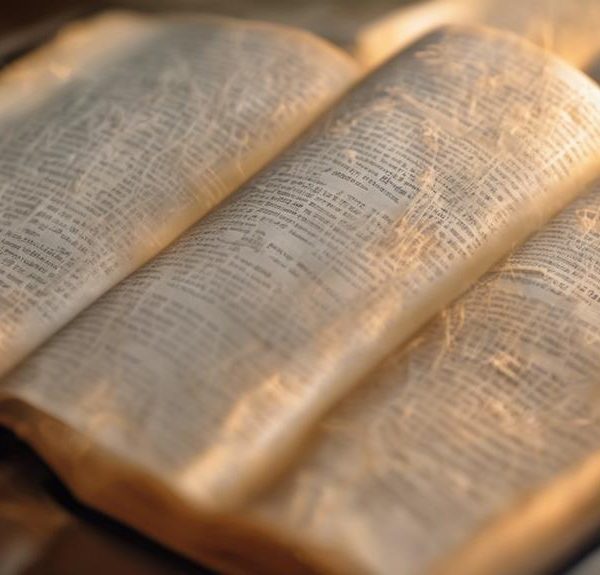
Sign up